Russian media comply with the principle of balanced coverage, whilst Belarusian media remain loyal to Officialdom. Kremlin narratives in Belarusian media – December 2020
Overview
We have monitored and analysed 1325 articles* (523 Belarusian and 802 Russian) published by leading media outlets in Russia and Belarus between December 1 and December 31, 2020, regarding Belarusian-Russian relations. Media monitoring focused on Russian publications referring to Belarus, Belarusian publications quoting Russian media outlets, and top-ranking articles indexed by Google News and Yandex News when searching for «Belarusian-Russian relations.» **
This report covers such topics as who borrowed content from whom, what information sources were used, and which references the media most frequently mentioned or quoted. Finally, we analysed and compared the key messages communicated by Belarusian and Russian media outlets.
Major findings
The state news agency BelTA and an independent news portal TUT.BY were equally frequent sources for the Russian media, indicating that they strive for a balanced approach when covering bilateral relations and developments in Belarus. Belarusian media primarily referred to the leaders of both states when covering bilateral ties.
Belarus and Russia’s leaders retained their positions as frequently mentioned public figures in both Belarusian and Russian media; however, in the Russian press, Tsikhanouskaya was mentioned more often than Putin.
The most popular narrative strands in the Belarusian media concerned the Russian covid-19 vaccine, gas price negotiations and Russian officials rhetorical support for the official Belarusian interpretation of the fight against protesters.
As in November, the most frequent narratives in the Russian media related to the troubles of the Belarusian ruling regime, including Western sanctions and the persistence of protests, which are dispersed using force. A newly significant topic was the International Olympic Committee’s decision to ban Lukashenka and other Belarusian NOC executive committee members from participating in the Olympic Games.
Belarusian media continued to positively report about Russia, whilst Russian media were more negative regarding Lukashenka and Belarus.
Timeline of events in December 2020
On December 2, chairing a CSTO meeting, Lukashenka suggested that NATO intends to seize the western part of Belarus on behalf of Poland.
On December 3, ex-presidential candidate Sviatlana Tsikhanouskaya announced her readiness to lead the country in a «transitional period.»
On December 7, the International Olympic Committee (IOC) suspended Lukashenka and other members of the Belarusian National Olympic Committee (NOC) from participating in the Olympic Games.
On December 7, the Council of Ministers of Belarus, citing the fight against covid-19, banned overland exit from the country, with a limited number of exceptions.
On December 8, the Board of Directors of JSC Belgazprombank promoted Deputy Chairman of the Management Board Irina Potapova to Acting Chairman. The interim administration completed work on December 10, 2020.
On December 8, Lukashenka proposed that the All-Belarus People’s Assembly should be a constitutional body.
On December 10, Lukashenka signed a law ratifying the intergovernmental agreement on the mutual recognition of visas between Russia and Belarus. This also regulates the entry of foreign citizens and stateless persons to the Union State.
On December 10, ex-presidential candidate Sviatlana Tsikhanouskaya called on Lithuania to impose sanctions against Belaruskali.
On December 11, the Coordination Council (CC) announced the commencement of work on Belarusian «people’s embassies” outside the country.
On December 11, the European Union launched the 24 million euro “EU4Belarus” programme, expressing solidarity with the Belarusian people. Within this framework, the EU plans to support civil society and independent media, youth, students and young professionals in Belarus. Financial resiliency advice for small and medium-sized businesses and healthcare is also planned.
On December 11, the Prime Ministers of Belarus and Russia, Roman Golovchenko and Mikhail Mishustin, discussed by phone the prospects for deeper Union State integration, trade and economic cooperation and the fight against covid-19.
On December 15, Belarus suspended the export of oil products through the port of Klaipeda.
On December 16, the “democratic opposition in Belarus, represented by the Coordination Council”, received the Andrei Sakharov Prize for Freedom of Thought for 2020.
On December 17, at a press conference, Russian President Vladimir Putin alleged that the Belarusian opposition is supported by foreign forces and that Lukashenka has initiated amendments to the Constitution of Belarus so people “just have to be patient and wait”. According to Putin, it is necessary “to help all political forces not to conflict with each other, but to set everyone up for a positive dialogue aimed at protecting the interests of citizens.”
On December 18, the November 19 agreement on cooperation between the Ministry of Internal Affairs of Belarus and the Russian National Guard was published.
On December 21, the Belarusian Health Ministry approved and registered the Russian Sputnik V vaccine.
On December 22, security officials raided the leadership of “Press Club Belarus” (the cultural and educational institution Journalist Workshop Press Club). The founder of the Press Club, Yulia Slutskaya, financial director Sergei Olshevsky, programme director Alla Sharko and cameraman Peter Slutsky were detained and remanded.
On December 22, the Apostolic Nunciature (the Vatican Embassy in Belarus) received official notification that there were no obstacles to the return of Archbishop of Minsk-Mogilev Metropolitan Tadeusz Kondrusiewicz to the country. At the end of August, the Belarusian authorities banned Kondrusiewicz as Lukashenka alleged that Kondrusevich “travelled to Poland and received advice on how to destroy the country”. On December 24, Kondrusevich returned to Belarus and held Christmas services in Minsk Archcathedral Church.
On December 23, Belarusian Ambassador to Russia Vladimir Semashko said that an agreement on gas supplies for 2021 would be reached by the end of 2020.
On December 23, the US State Department imposed visa restrictions on 39 persons involved in undermining democracy in Belarus. In total, there are 63 Belarusian officials on the US sanctions list.
On December 29, the first batch of the Russian Sputnik V vaccine arrived in Belarus.
On December 29, Belarus and Russia approved a schedule for Russian oil supplies in Q1 2021. According to TASS, citing a source, the export of 4.5 million tons of oil to Belarusian refineries is envisaged.
On December 30, the OMON of the Minsk City Executive Committee conferred upon Lukashenka their highest award, ‘a black beret’.
On December 30, the first tranche of the Russian state loan totalling USD 500 million was transferred.
On December 31, ex-President of Ukraine Petro Poroshenko stated that in 2018 he authorised a “special operation”, as a result of which 33 Russian mercenaries of the PMC Wagner Group were detained in Belarus in July 2020.
Analysis of information sources
Monitored Belarusian media outlets referred to 961 information sources, whilst their Russian counterparts referred to 1428, including references to other media outlets, public bodies, institutions, and individuals when reporting facts and direct quotes.
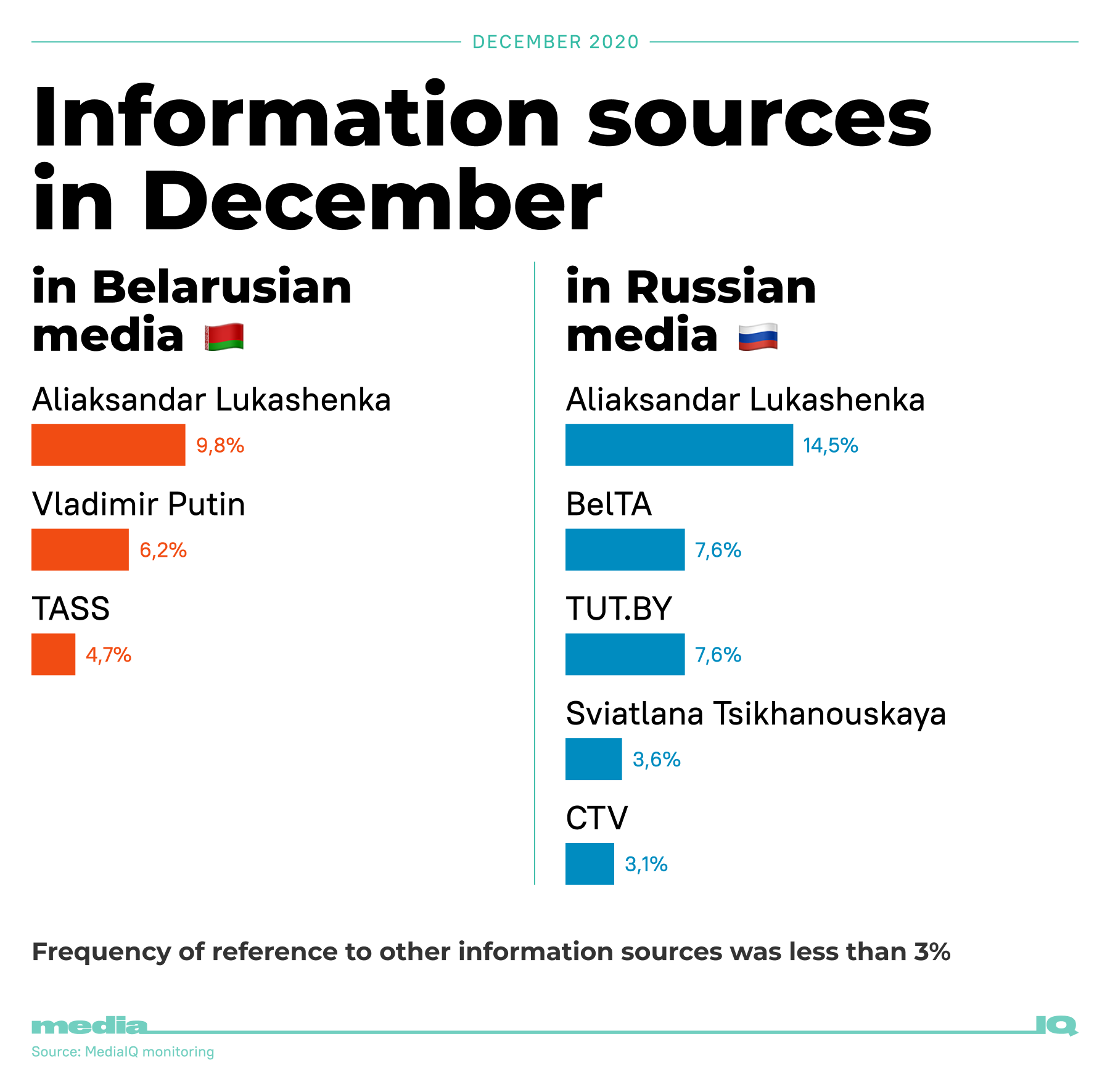
Aliaksandar Lukashenka was the most frequent source of information for both Russian and Belarusian media outlets. His principal opponent, former presidential candidate Sviatlana Tsikhanouskaya, was frequently cited only by Russian media outlets.
Belarusian media in December primarily referred to the leaders of both states and to TASS when covering bilateral relations.
In November, Russian Foreign Minister Sergei Lavrov was a prolific source for Belarusian media. The picture in October and December was similar, while in September, Kremlin press secretary Dmitry Peskov and the Belarusian news agency BelTA were frequently referenced sources. This means that when covering Belarusian-Russian relations, Belarusian media are mainly reporting official statements.
In December, the state news agency BelTA and the TUT.BY independent news portal were equally frequent sources for the Russian media, which indicates that they are attempting to take a balanced approach when covering bilateral relations and developments in Belarus.
The Belarusian TV channel CTV appeared amongst the frequently referenced sources in Russian media in December, as it was a convenient source for citing video reports from meetings with Lukashenka and interviews with Belarusian officials (RBC used it more often than others).
Key figures in media articles
In respect of integration-related matters, the Belarusian Media mentioned 405 persons, and Russian, 429. We include people identified by their first and last names regardless of whether an article was directly about them. We did not assess who played a greater or lesser role in the story; the score is determined by the number of documents mentioning a particular person in the reporting period.
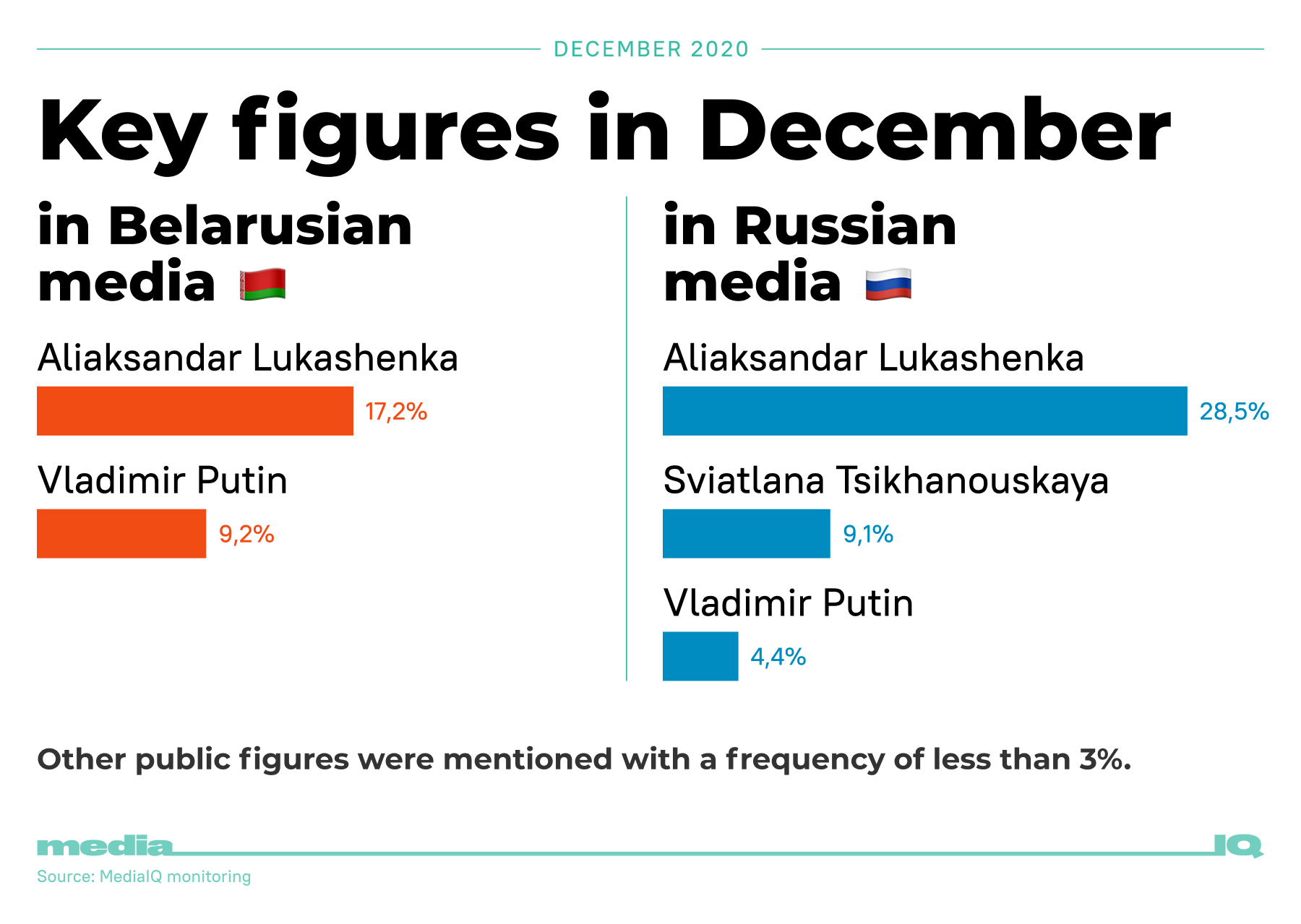
Belarusian and Russian leaders retain their positions in terms of frequency of reference in the media of both states in December. It is worth noting that for the Russian media, Tsikhanouskaya was mentioned more often than Putin when covering Belarusian-Russian relations.
Analysis of messages communicated
In December, Belarusian and Russian media outlets followed different narratives, with little overlap.
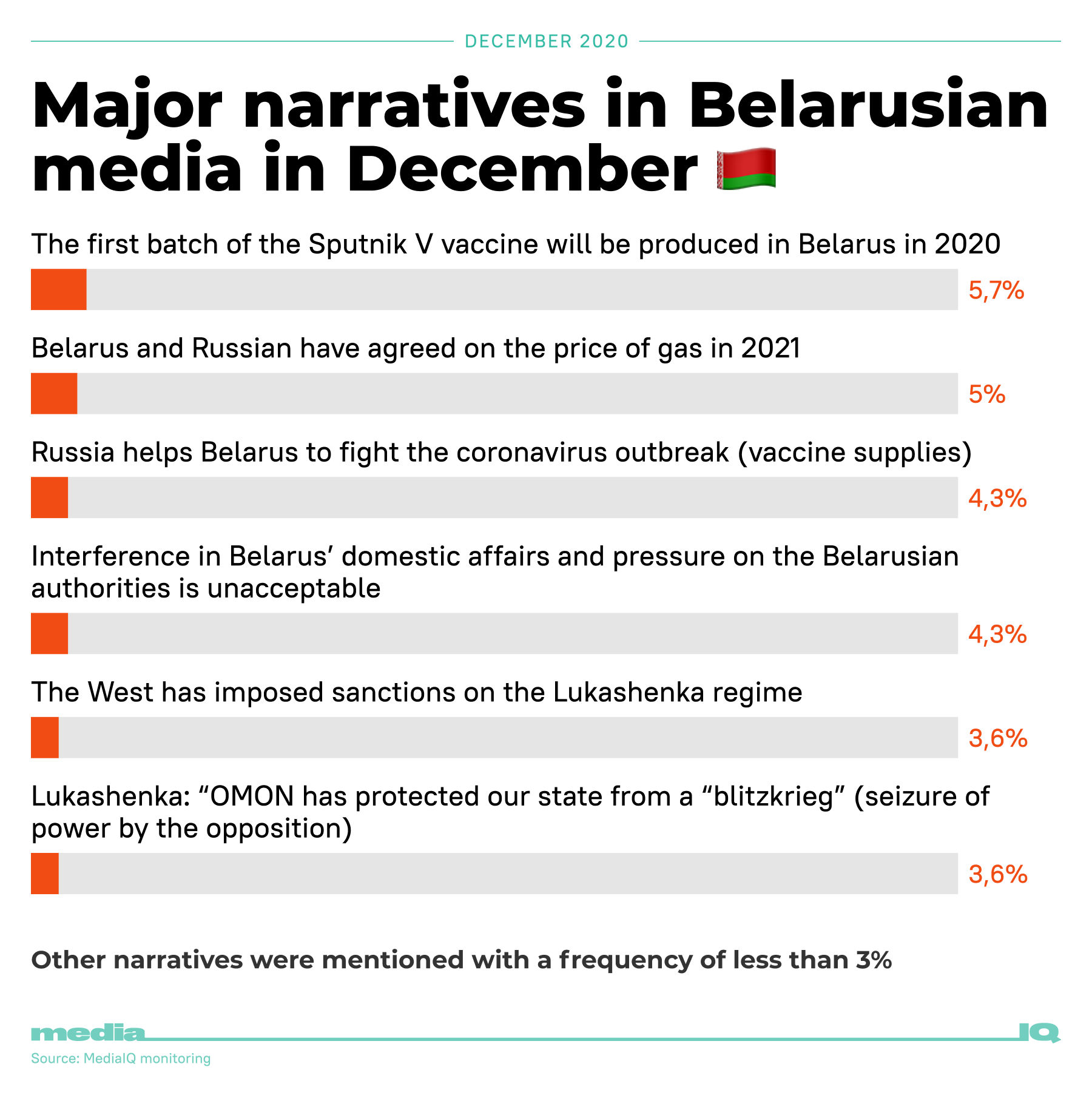
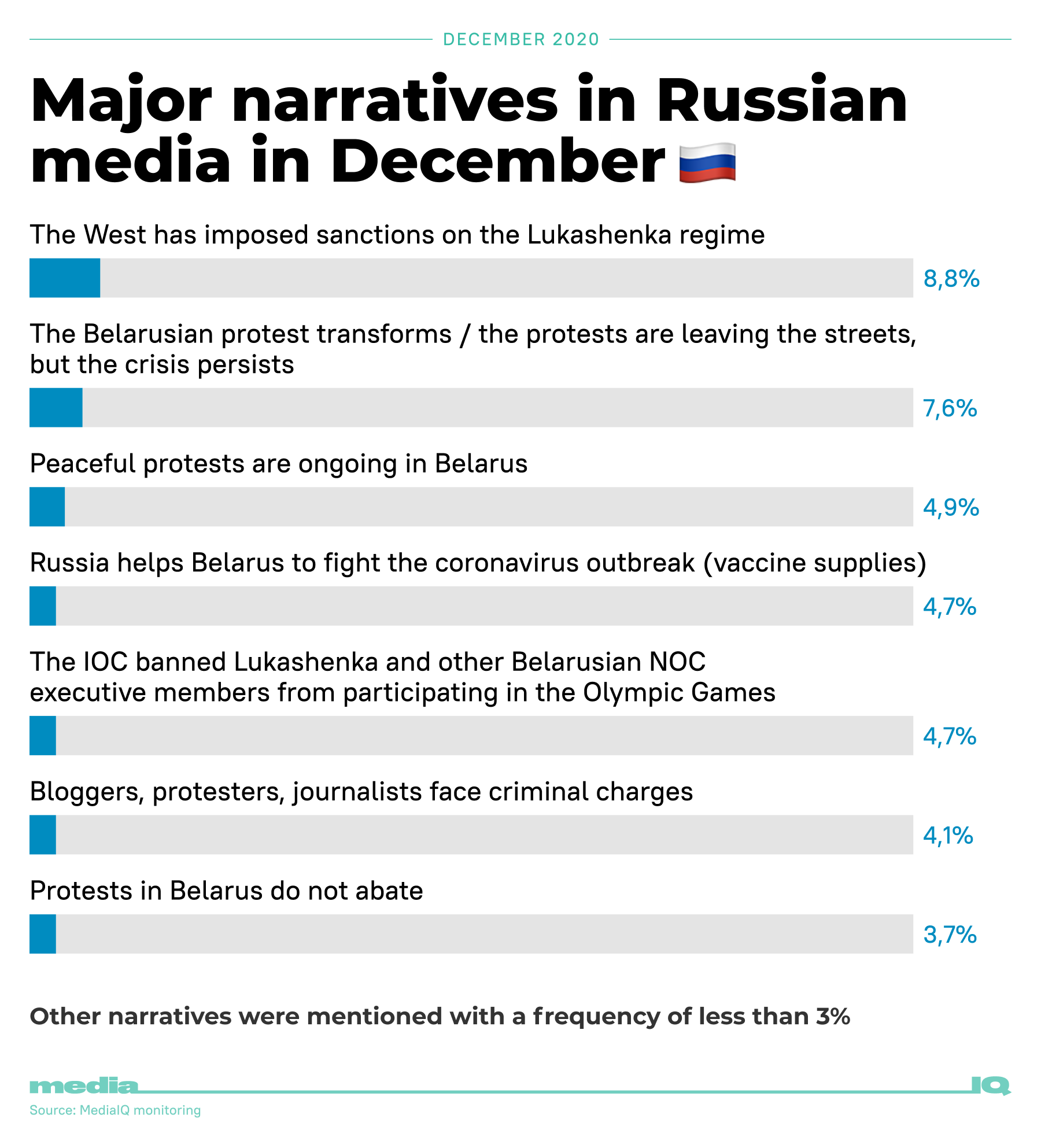
Reports related to the Sputnik V Russian covid-19 vaccine dominated Belarusian media in December, along with harmonisation of gas prices and the rhetorical support from Russian officials for the Belarusian regime’s interpretation of the fight against protesters.
As in November, the most frequent narratives in the Russian media related to the troubles of the Belarusian ruling regime, including Western sanctions and the persistence of protests, which are dispersed using force. A newly significant topic was the International Olympic Committee’s decision to ban Lukashenka and other Belarusian NOC executive committee members from participating in the Olympic Games. Coverage of this topic in the Russian media took three primary forms:
- stating the facts without revealing the reasons behind the IOC decision (prevailing);
- stating the facts and indicating that this is an IOC response to the political persecution of athletes by the Lukashenka regime (minority);
- using the story to repeat claims of double standards applied by the West, create linkage to the “unfair” punishment of Russian athletes by the World Anti-Doping Agency (WADA) and imply an international conspiracy against Russia and her ally, Lukashenka.
Belarusian propaganda wrote positively about Moscow, whilst Russian media provided negative coverage of Lukashenka and Belarus
Analysis of less frequent narratives grouped by broader topic shows that in December, as in previous autumn months of 2020, Belarusian Media referred to Russia in favourable terms, whilst Russian media perspectives regarding Belarus/Lukashenka tended negative.
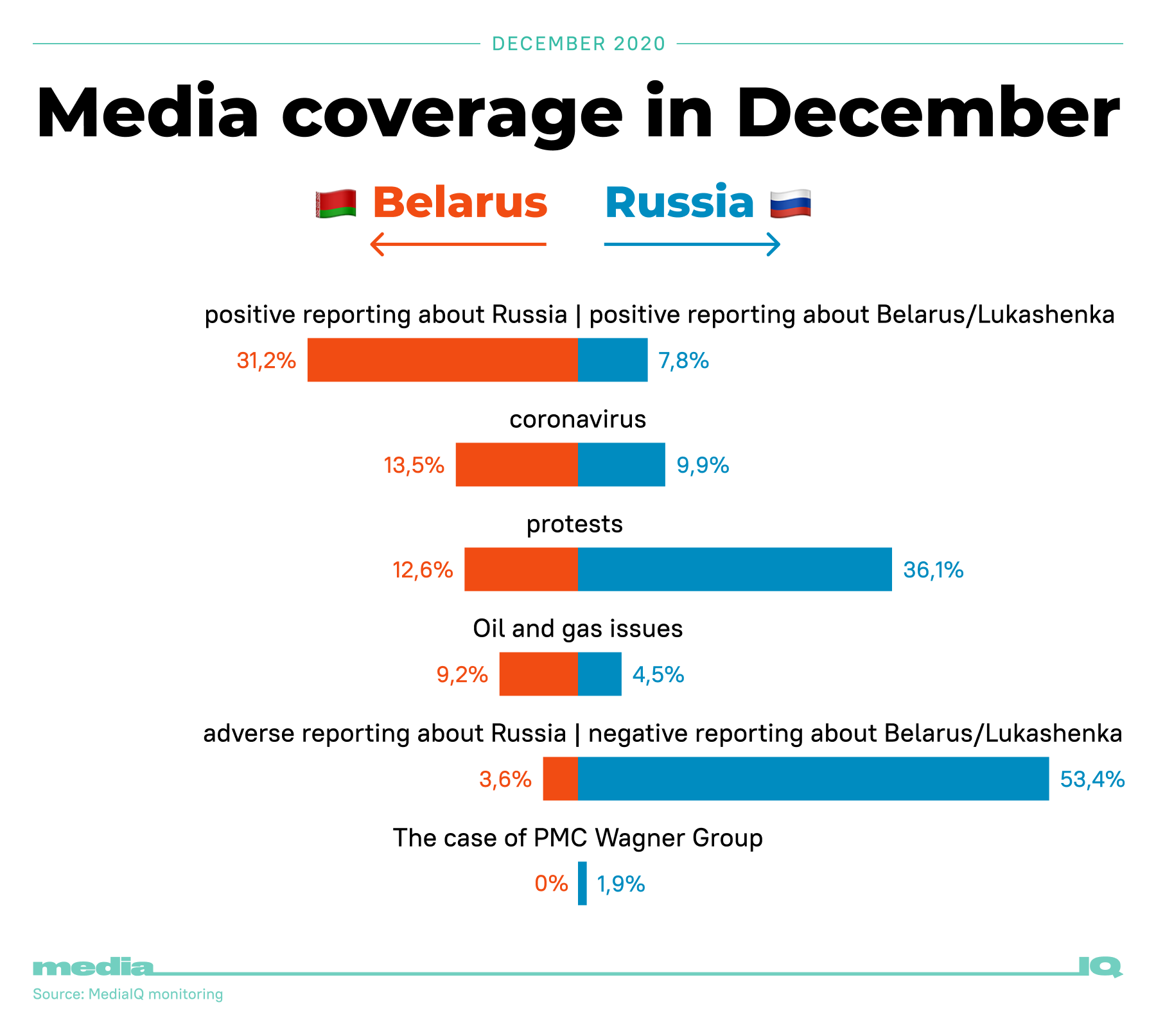
On the margins, the Russian media focused on the ex-President of Ukraine Petro Poroshenko’s confession that he initiated the operation against the Russian PMC Wagner in Belarus, an incident which sharply exacerbated Belarusian-Russian relations before the Belarusian presidential elections.
In the Belarusian and Russian media in December, there were infrequent references to Poland’s alleged plans to seize part or all of Belarus with the help of NATO. This narrative aligns with the assertion that “Poland has become the main operator of the ‘colour revolution’ in Belarus”. However, the media also referred to Polish and NATO responses to these allegations.
In attacks against Poland, some Belarusian state media used the rhetorical technique of vague innuendo, emphasising that Poland’s involvement in the Belarusian protests was not accidental. For example, the BelTA report from the CSTO Summit said: “According to Aliaksandar Lukashenka, external interference was the cause of the aggravation of the situation in Belarus.“ The point being, I quote, “in the historical belonging of the Belarusian lands to Poland.” This is openly stated. Can I, as the president and the Belarusians, agree with this? It turns out that where we live today, these lands do not belong to us. It is known to whom [they belong]. This is how they act,” the head of state noted.”
The Russian national media, such as RIA Novosti, Vesti.Ru, did not pursue this line of reasoning; they only quoted Lukashenka’s statement: “A military group is being created in NATO to seize the western Belarusian lands.” Lenta.ru drew general conclusions based on the Lukashenka’s statement: “From the very beginning of the mass protests in Belarus on August 9, Lukashenka has regularly accused Poland, the Baltic states, and Ukraine of financing the opposition and coordinating rallies.”
* Due to an extensive coverage of Belarusian-Russian issues, we reduced in number the media outlets subject to monitoring.
** 523 articles in 12 Belarusian media (Belarus 1, Belsat TV, BelTA, Nasha Niva, ONT, SB. Belarus Today, Sputnik Belarus, CTB, Euroradio, Naviny.by, Onliner, and TUT.BY) and 802 articles in 12 Russian media (Vedomosti, Vesti.Ru, Izvestia, Interfax, Kommersant, “Kommersant FM”, RBC, RIA Novosti, TASS, “Ukraina.ru”, Ekho Moskvy, and Lenta.ru).
In Belarus, the most extensive coverage was provided by Sputnik Belarus (19.24% of all articles), TUT.BY (14.4%) and Naviny.by (12.6%). In Russia – Lenta.ru (20.9%), Interfax (13.6%) and Ukraina.ru (13.1%). In Belarus, four TV Channels and nine online media outlets are subject to regular Media IQ monitoring (please see the list of Belarusian media outlets in attachment 5).
